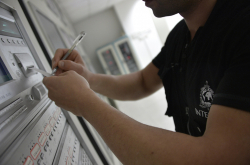ARUSHA, Tanzania – Regional alliances are essential to effectively combat rising cross-border crime, said Secretary General Jürgen Stock in his address to the Eastern Africa Police Chiefs Cooperation Organization (EAPCCO) General Assembly.
The INTERPOL Chief underlined the importance of the Organization’s work with EAPCCO to better understand and meet regional policing needs and advance the regional security agenda.

He highlighted the work of the INTERPOL Regional Bureau in Nairobi in bringing together 17 African countries to negotiate a joint agreement between Eastern and Central Africa to deal with the rise of cross border crimes.
The agreement sets the stage for greater and easier police work across both regions through increased information exchange and collaboration, supported by INTERPOL projects such as I-ONE, I-CORE and ENACT for better operational results.
Secretary General Stock pointed to several successful cross regional initiatives, such as the Usalama operations. Involving both EAPCCO and SARPCCO, targeted actions against transnational crimes including human, drug and arms trafficking, people smuggling, terrorism, car theft and environmental crime, resulted in the arrest of more than 900 suspects.


In March, during Operation Simba - which aimed to strengthen border controls in particular across Kenya, Tanzania and Uganda - in just 10 days, some four million checks were carried out against INTERPOL databases, resulting in more than 800 positive hits. These included individuals wanted for terrorism, genocide, fraud and trafficking.
Following the terrorist attack in Nairobi in January, at the request of Kenyan authorities, INTERPOL deployed a team within 24 hours to assist with disaster victim identification, criminal intelligence analysis, digital forensics and weapons and explosives expertise. Data was exploited and investigative leads were established, stretching well beyond the borders of Kenya.
INTERPOL also coordinated an international team to support Ethiopian authorities identify victims of the Ethiopian Airlines flight ET302 crash in March 2019. More than 8,000 DNA samples were collected, leading to the successful identification of all victims of the disaster.
Secretary General Stock told the EAPCCO General Assembly that these few examples showed the value of information sharing and police cooperation at the national, regional and international levels.










